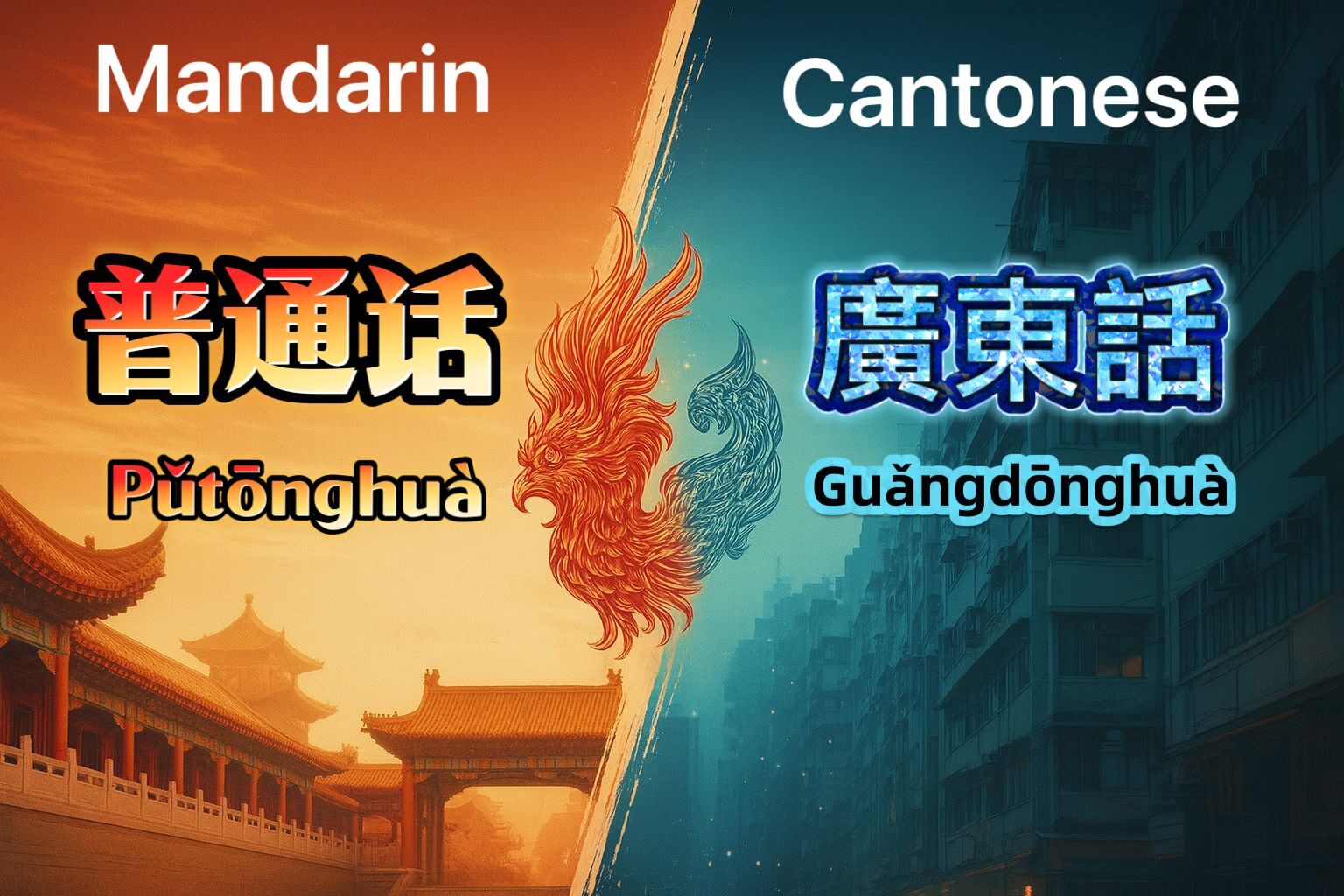So you’ve decided to dive into the world of Chinese languages – congratulations! You’re about to embark on one of the most rewarding linguistic adventures possible. But here’s where things get interesting: when most people say they want to “learn Chinese,” they’re actually faced with a choice that could dramatically shape their entire learning experience.

The question isn’t just “Should I learn Chinese?” – it’s “Should I learn Mandarin or Cantonese?”
As someone who’s spent years helping students navigate this exact decision at LingoClass, I can tell you that this choice matters more than you might think. These aren’t just different dialects of the same language – they’re distinct languages that can take you down completely different cultural and practical paths.
The Tale of Two Languages
Let me start with something that might surprise you: calling Mandarin and Cantonese “dialects” is a bit like calling Spanish and Italian “dialects of Latin.” Sure, they share common roots in the Sino-Tibetan language family, but the differences run deep.
Mandarin (known as Putonghua or 普通话 in China) is the heavyweight champion of Chinese languages. With over a billion native speakers, it’s the official language of China and Taiwan, and one of Singapore’s four official languages. It’s the language of business, government, and education across most of the Chinese-speaking world.
Cantonese (廣東話 or Yue 粵語), on the other hand, is more like the cool, artistic cousin. Primarily spoken in Hong Kong, Macau, Guangdong Province, and thriving diaspora communities from Vancouver to San Francisco, Cantonese punches above its weight culturally. Ever watched a Bruce Lee film or hummed along to Cantopop? That’s Cantonese culture at work.
## The Sound of Difference
Here’s where things get really interesting from a learner’s perspective. If you think Mandarin’s four tones are challenging, Cantonese will humble you with its 6-9 tones (depending on who’s counting). This tonal complexity gives Cantonese an almost musical quality that many learners find both beautiful and bewildering.
Take the simple example of talking about your mother versus a horse:
– In Mandarin: mā (妈, mother) vs mǎ (马, horse)
– In Cantonese: mā (媽, mother) vs máh (馬, horse)
But it’s not just about tones. Cantonese has preserved ancient Chinese sounds that Mandarin has lost over time. You’ll hear those crisp final consonants (-p, -t, -k) that give Cantonese its distinctive “punchy” rhythm. It’s like hearing Chinese history in real-time.
The Writing Challenge
Now here’s where your learning journey gets a plot twist. Both languages use Chinese characters, but which version depends entirely on where you’re planning to use your skills.
Mainland China simplified their characters in the 1950s, creating what we now call Simplified Chinese (简体字). Meanwhile, Hong Kong, Taiwan, and many overseas communities stuck with Traditional Chinese (繁體字) – the original, more complex forms.
But wait, there’s more! Written Cantonese often uses unique characters that don’t exist in standard Mandarin texts. Characters like 喺 (meaning “at/in”) or 咩 (meaning “what?”) are pure Cantonese gold that you won’t find in your Mandarin textbook.
## Lost in Translation (Literally)
Here’s a reality check that surprises many learners: Mandarin and Cantonese speakers can’t understand each other when speaking. At all.
A Mandarin speaker hearing Cantonese for the first time would be as lost as an English speaker trying to understand Dutch. The vocabulary differences are that significant:
– “Good morning”: 早安 (Mandarin) vs 早晨 (Cantonese)
– “Thank you”: 谢谢 (Mandarin) vs 多謝 or 唔該 (Cantonese)
– “To eat”: 吃 (Mandarin) vs 食 (Cantonese)
## The Cultural Gateway
This is where your choice becomes deeply personal. Learning Mandarin opens doors to mainland China’s incredible economic growth, technological innovation, and modern cultural renaissance. You’ll be able to engage with contemporary Chinese literature, business opportunities, and the country that’s reshaping the global economy.
Choose Cantonese, and you’re tapping into something equally powerful but different – the creative heart of international Chinese culture. Hong Kong cinema, the underground music scene, the entrepreneurial spirit of overseas Chinese communities. It’s Bruce Lee’s philosophy, Stephen Chow’s comedy, and the bustling energy of dim sum restaurants worldwide.
Making Your Choice
So which should you choose? Here’s my honest advice after years of teaching both at [LingoClass](https://www.lingoclass.co.uk/mandarin-cantonese-differences):
Choose Mandarin if:
– You’re interested in business opportunities in mainland China
– You want maximum global utility (sheer numbers matter)
– You prefer more structured learning resources
– You’re planning to work in international relations or global business
Choose Cantonese if:
– You’re drawn to Hong Kong culture and lifestyle
– You have family or community connections to Cantonese-speaking regions
– You love the idea of preserving a more traditional form of Chinese culture
– You’re fascinated by linguistic complexity and historical preservation
The Bottom Line
There’s no wrong choice here – only the choice that’s right for your goals, interests, and circumstances. Both languages will challenge you, reward you, and open up incredible cultural worlds you never knew existed.
What matters most is starting. Whether you choose the global reach of Mandarin or the cultural richness of Cantonese, you’re about to discover that learning Chinese isn’t just about memorizing characters and tones – it’s about connecting with thousands of years of human culture and creativity.
Ready to take the plunge? The world of Chinese languages is waiting for you, and trust me – it’s going to be an incredible journey.
—
*Interested in starting your Chinese language journey? Whether you choose Mandarin or Cantonese, having the right guidance makes all the difference. Check out our comprehensive language programs and expert instruction at LingoClass – where your Chinese adventure begins.*
